IntelliJ IDEA is one of the best code editor and software development platforms for the JAVA programming language.
The app offers a centralized platform for developers to debug a code, perform code refactoring, and reduce technical debt quickly. As Java developers use IntelliJ for multiple tasks, tracking time on the platform is essential to boost productivity and bill clients accurately.
So how do you track time on IntelliJ IDEA?
In this article, we’ll explore if IntelliJ IDEA offers native time tracking and why tracking time while using the tool is essential. We’ll also highlight four incredible time trackers to help you choose the right one.
Table of Contents
- Does IntelliJ offer native time tracking?
- 3 reasons to use a dedicated IntelliJ time tracking tool
- 4 incredible tools for IntelliJ time tracking
Let’s dive right in!
Does IntelliJ offer native time tracking?
IntelliJ IDEA is an Integrated Development Environment (IDE) created by Jetbrains for Java developers. Jetbrains (in partnership with Google) also offers an Android programming tool called Android Studio.
With IntelliJ IDEA, a developer can customize the app’s user interface to suit their needs, enable workflow automation, use keyboard shortcuts, and much more.
Here are some other IntelliJ IDEA features:
- Issue tracker.
- Version control systems.
- Configure different breakpoints like line, method, and exception breakpoints.
- Syntax highlighting.
- Run time debug configurations.
- Commit message templates.
- Context sensitive code completion.
But IntelliJ IDE doesn’t offer any time tracking feature to track developer productivity.
Instead, users can track time on IntelliJ Ultimate using extensive time tracker plugins, such as:
- Darkyen’s Time Tracker: Hosted on GitHub, the plugin shows tracked time in the form of a simple status bar.
- WakaTime: This is an open source metrics dashboard that helps track the time a developer spends on IntelliJ IDEA.
- YouTrack: Developed by Jetbrains for Agile development tools, YouTrack offers Gantt charts, timesheets, and sprint time tracking.
- Code Time: This open source plugin supports time tracking on most coding apps like Visual Studio.
But are these plugins sufficient for a productive IntelliJ time tracking experience?
Most IntelliJ IDEA plugins aren’t user-friendly, and developers may take time to figure out their basic functionality. Some plug-ins don’t monitor idle minutes, which means a developer’s breaks could be counted as productive time.
You may also have to invest in additional payroll processing tools since not all IntelliJ time tracking plug-ins offer payroll management features.
That being said, let’s look at a few reasons why you need a comprehensive time tracking tool to track time while using IntelliJ IDEA.
3 reasons to use a dedicated IntelliJ time tracking tool
Here are three ways advanced time tracking can enhance software development in IntelliJ IDE:
1. Enhance developer productivity
Most software companies consider developer productivity a critical Key Performance Indicator (KPI). Developer productivity basically tracks how productive a developer is during a given time period.
To monitor developer productivity, companies track certain workflow aspects such as:
- Lines of code per staff per month.
- Function points per staff per month.
- Pull requests.
- Number of commits.
Measuring these aspects with a powerful time tracker gives insight into your developers’ workflow.
How?
A time tracker can help track the time developers spend on each task. You can then compare this data with previous results or other employees’ data. The time data also lets you spot an issue in developer workflows, like time management or a scheduling issue.
For example, if you find a developer is taking too long or has trouble executing a work item, you can provide additional training or reassign it to another developer.
This way, your company can enjoy improved workflows and avoid bottlenecks that affect productivity.
2. Improve project management
Tracking developers’ projects let you access insightful data, helping you improve project management.
With time tracking data, you can:
- Create estimates for similar future projects.
- Develop project roadmaps.
- Set realistic work schedules.
Since a time tracking tool lets you know the exact time you spend on a task, you can charge your clients accurately for the actual work done or quote accurate estimates for a new project.
Time tracking also eliminates the need for managers to micromanage their developers. That’s because most time trackers give real time updates of what each developer is working on. This way, you don’t have to waste time physically checking up on your team members.
Check out our informative guide to discover more benefits of time tracking in project management.
3. Build transparent customer relationships
Trust and transparency play essential roles in customer acquisition and retention.
Time data gives your client a clear idea of how you spend their budget. This way, your clients can ensure that you’re not overcharging or undercharging them, leading to a more transparent client relationship.
For example, If a client raises an issue with a project’s completion time, you can produce time tracking reports to show them why the task or project took more time.
Now that you know how tracking time can help you, all you have to do is invest in an advanced time tracker that suits your business needs.
Let’s check out some excellent time tracking tools.
4 incredible tools for IntelliJ time tracking
Here are four fantastic time tracking tools for developers:
1. Time Doctor
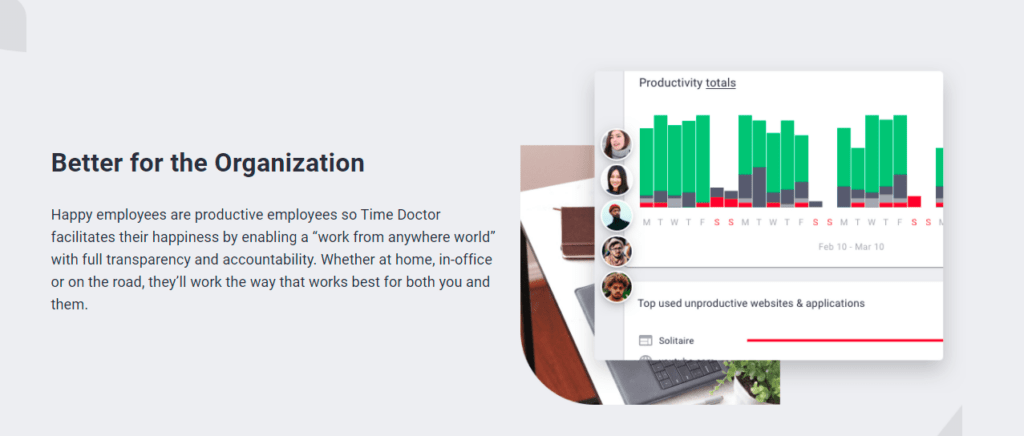
Time Doctor is an all-in-all powerful time tracking and performance management tool used by small businesses like Thrive Market as well as major companies like Ericsson.
With Time Doctor, you can track developers’ time accurately, create schedules, and increase client satisfaction by boosting transparency and improving developer productivity metrics.
But that’s not all!
Key features
Let’s take a look at some of Time Doctor’s most notable features:
1. Time tracking
Time Doctor offers user-friendly automatic and interactive time trackers to track time effortlessly.
The interactive or manual mode lets employees start and stop the timer according to their work schedules with just one click.
Here’s how:
- Open Time Doctor, enter the task’s name or select an existing task.
- Employees can click Start when they’re ready to begin and Stop when done or need to pause.
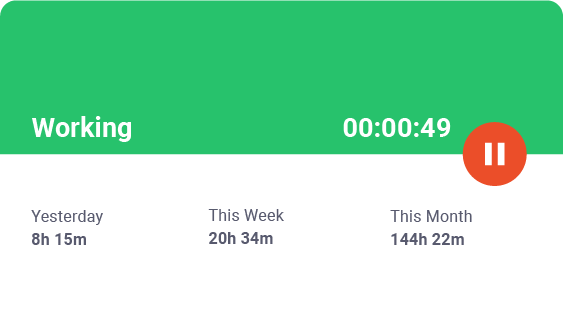
The automatic time tracker runs silently in the background without disturbing developers’ workflow. It automatically tracks computer usage once a developer switches on their monitor.
2. Idle time tracking
Time Doctor has an idle time tracking feature that informs you and your employees about their unproductive hours.
If Time Doctor detects no mouse and keyboard activity for a predefined time, it sends an idle time pop-up to alert the developer. If the alert is ignored, the tool assumes that the developer is on a break and pauses the timer.
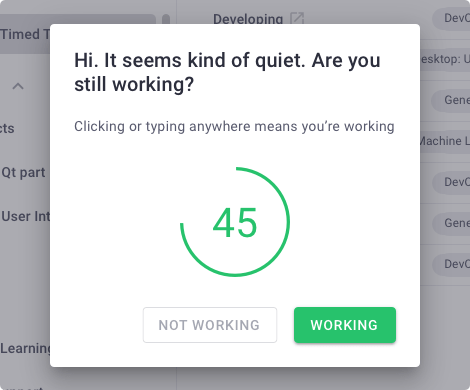
Note: Time Doctor doesn’t support keylogging. To protect user privacy, it only checks if the keys and mouse are in use.
3. Projects and tasks
Time Doctor helps improve task management by letting you assign a new project or task to your employees.
Here’s how:
- Select Project/Tasks in Settings.
- Click on Add Project and create a new project.
- Click on New Task in the Tasks tab to create a smaller task.
- Select your project assignees for the new project on the People tab.
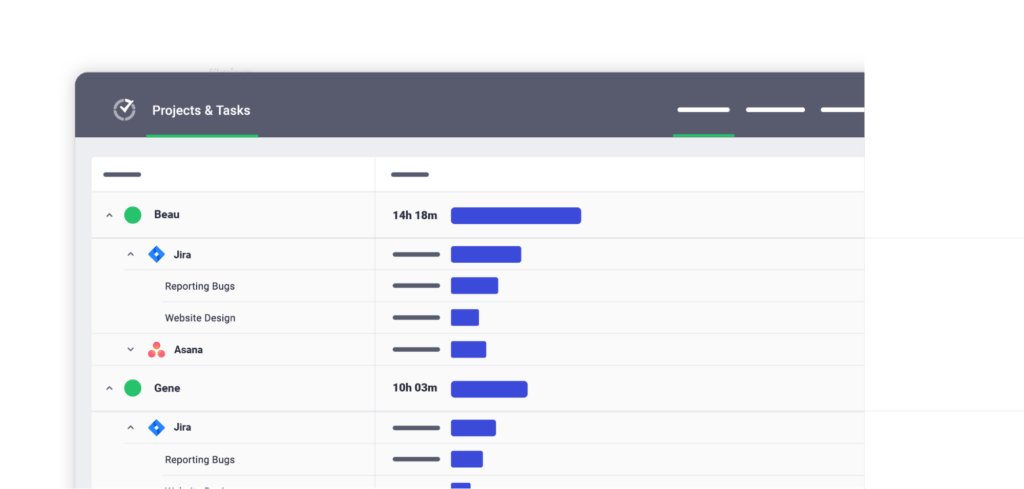
4. Work schedules
Time Doctor offers excellent scheduling features to help you create and edit productive work schedules for your software development team.
Here are some of the work schedule features:
- Add daylight savings for specific time zones and teams in foreign countries.
- Create individual schedules for each employee.
- Set custom permissions to enable selected employees to edit or view schedules.
- Export schedules to CSV file format for easy editing and sharing.
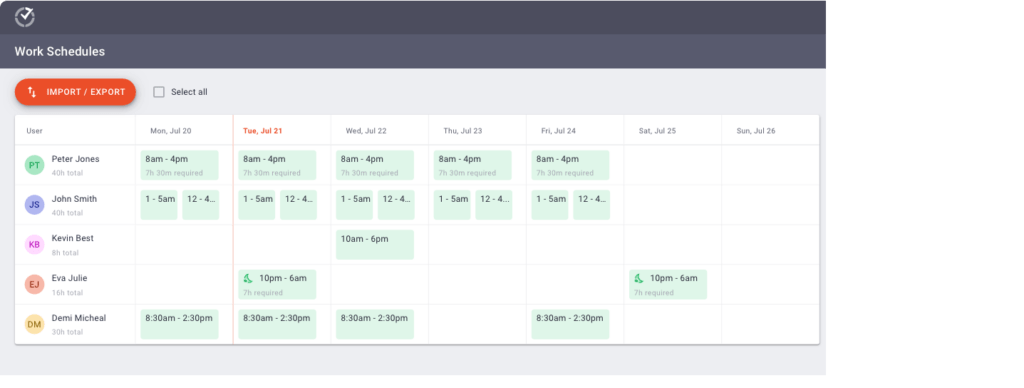
5. Productivity ratings
Time Doctor’s productivity ratings feature lets you categorize apps and websites according to the context and relevance to your developers’ workflow. This helps you check if developers are spending their work hours productively.
You can classify websites into four categories:
- Productive.
- Unproductive.
- Neutral.
- Unrated.
For example, if your developer uses Quora to learn more about machine learning, you can classify the website as productive.
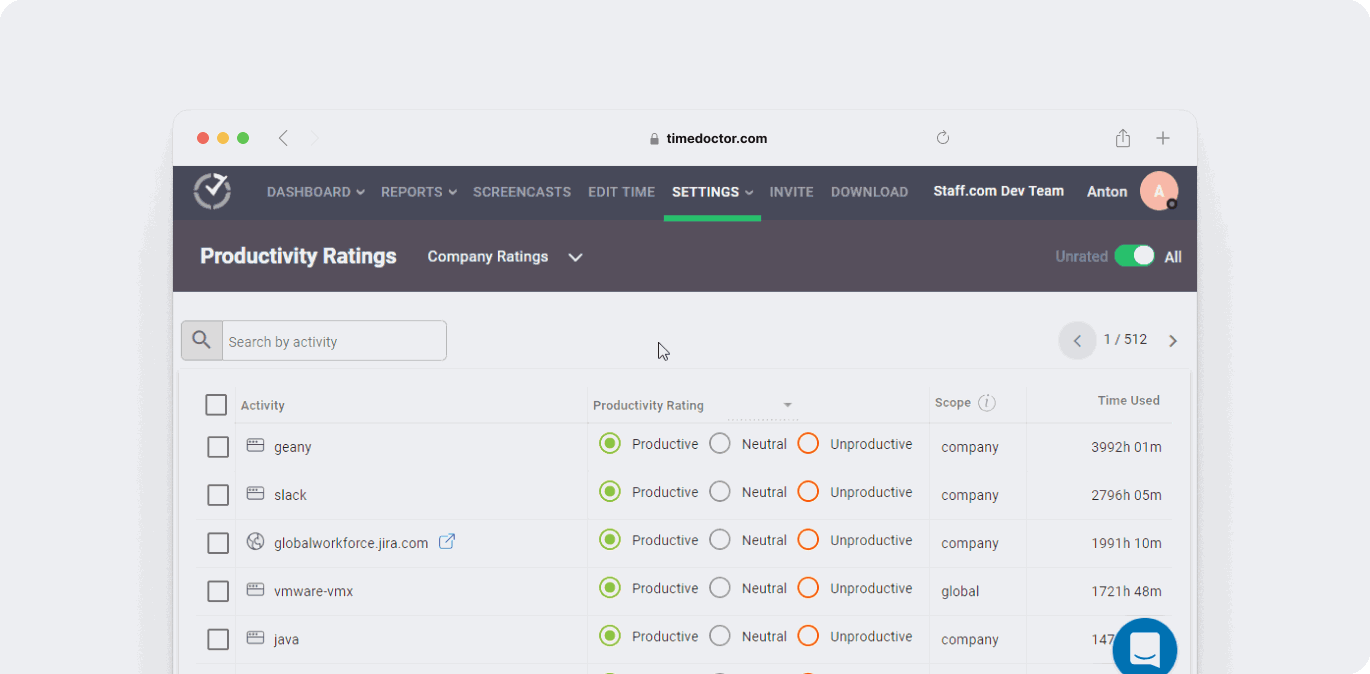
6. Comprehensive reporting
Time Doctor generates real time reports and analytics powered by accurate time tracking data. You can use it to view productivity metrics and check the time spent on specific projects.
Here are a few reports the tool generates using the time tracking data:
- Hours tracked report: Check the total number of hours tracked by your team members during any day, week, or month.
- Timeline report: Track the start and end time logs of your developers’ daily and weekly tasks.
- Web & app usage report: Track the trends for an employee’s unproductive and productive time based on their time spent on different websites and apps.
- Projects and tasks: Track the total hours worked on a specific project or task.
- Attendance report: Check when a developer is present, absent, late, etc., based on their schedule and tracking information.

7. Payroll management
Once you have your developers’ accurate work hours data, Time Doctor automates payroll processing based on their fixed salary rates and working hours.
Time Doctor integrates with payment gateways like Paypal and Wise (previously known as Transferwise) to reduce dependencies on manual billing and pay salaries on time. Moreover, you can easily add pay rates for each developer and specify the currency.
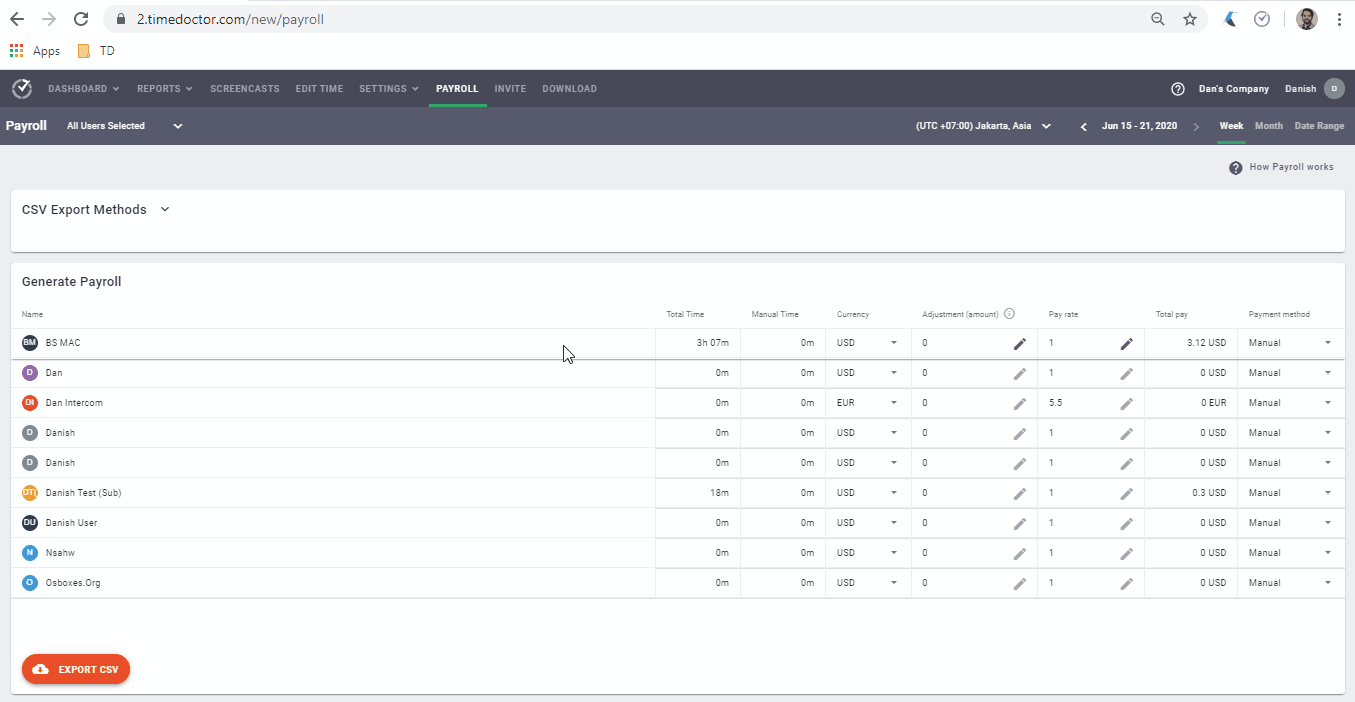
Pricing
Time Doctor offers a free 14-day trial that doesn’t require credit card information. Its pricing plans start as low as $7/user per month.
Customer ratings
- G2: 4.4/5 (280+ reviews)
- Capterra: 4.5/5 (410+ reviews)
Explore more of Time Doctor’s amazing features here!
2. DeskTime
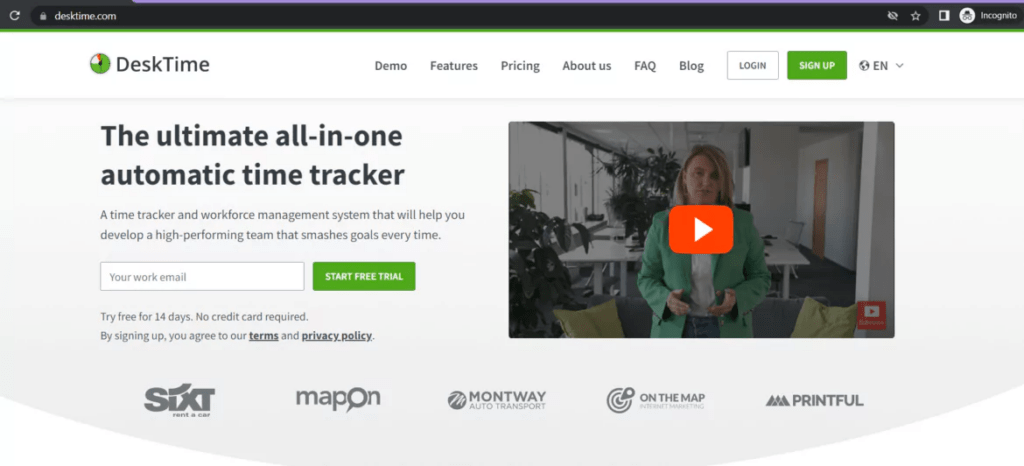
DeskTime is a cloud-based workforce management app that tracks developer productivity and time. The app features an easy-to-use user interface, custom reporting, and attendance tracking features.
Key features
- Tracks programming activity as soon as your developer switches on their computer.
- Lets your developer take breaks from long coding hours with its Pomodoro feature.
- Allows you to coordinate sick leaves or planned vacation time via its absence calendar.
- Helps you quote accurate prices for a new project with its project feature.
Pricing
DeskTime offers a free plan for a single user. Its paid plans start from $7/user per month.
Customer ratings
- G2: 4.5/5 (145+ reviews)
- Capterra: 4.5/5 (290+ reviews)
3. TimeCamp

TimeCamp is a time tracking tool with a simple user interface for small and medium-sized software development businesses. The time tracking tool is available as a desktop, web, and mobile app.
Key features
- Lets your team track time using keywords like a project name or activity (coding, programming, etc.)
- Offers real time GPS tracking for developers working remotely.
- Lets you set up customized reports to suit your business needs.
- Enables developers to track time on developer apps like Jira, Visual Studio, and Visual Studio Code (VS Code) via powerful integrations.
Pricing
TimeCamp offers a free tool. Its paid plans start from $7/user per month.
Customer ratings
- G2: 4.6/5 (180+ reviews)
- Capterra: 4.7/5 (555+ reviews)
4. Timely App
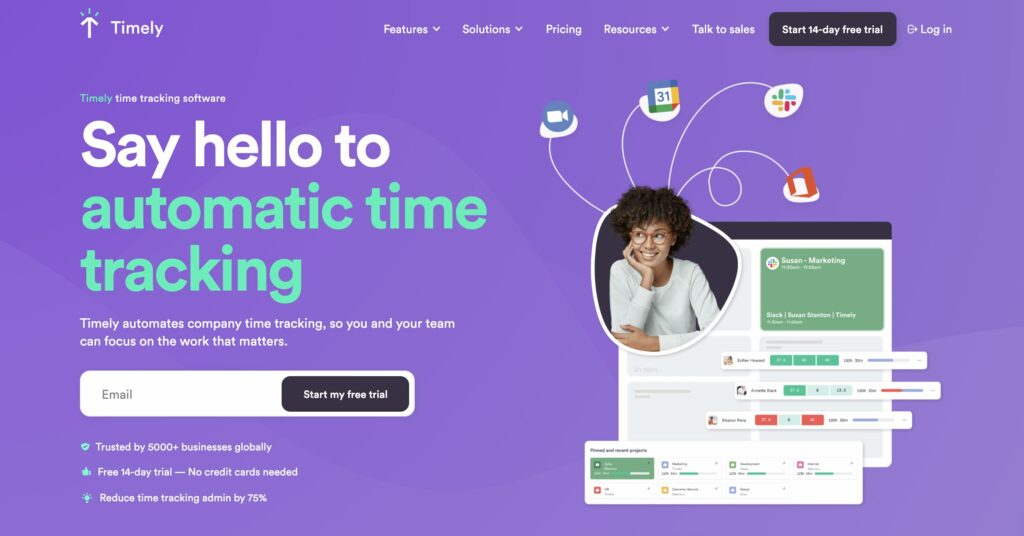
Timely is an automatic time tracking software for freelancers and small to medium-sized businesses. Timely also pairs well with developer apps like Sublime Text, GitHub, and Visual Studio.
Key features
- Tracks developer performance through real time productivity dashboards and time logs.
- Enables you to manage teams by allocating tasks and monitoring individual contributions.
- Lets you create project roadmaps to deliver work items on time.
- Alerts you on critical project health factors such as exceeding the budget.
Pricing
Timely offers a 14-day free trial. The app’s paid plans start from $8/user per month.
Customer ratings
- G2: 4.8/5 (200+ reviews)
- Capterra: 4.7/5 (200+ reviews)
Wrapping up
With effortless code completion, refactoring, and custom ESlint rules (via integration), IntelliJ IDEA provides developers with almost everything they need for software development projects.
However, IntelliJ IDEA only offers basic time tracking options. Without advanced time tracking, your business can be hit by low productivity, time theft, poor project management, and inaccurate invoicing.
But don’t worry!
Investing in a powerful time tracking tool like Time Doctor helps you track developer productivity metrics, view comprehensive reports, and more while using IntelliJ for coding and other development needs.
So sign up for Time Doctor’s 14-day free trial and empower your development team with top-notch productivity features!


